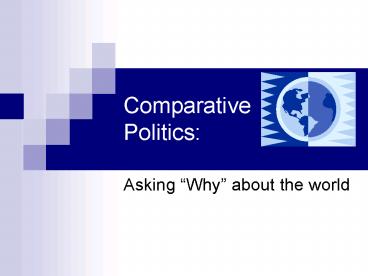Comparative Politics: - PowerPoint PPT Presentation
1 / 20
Title: Comparative Politics:
1
Comparative Politics
- Asking Why about the world
2
CP as a subfield of Political Science
How does CP differ from Political Theory and IR?
Why did the division between CP and IR began to
wane in the late 20th century?
3
What is Comparative Politics?
- Study of Politics Within Countries
- Emphasis on politics as they are, not as they
should be - Implicit and explicit emphasis on comparing and
contrasting politics within and between
countries, eras, regions
4
Tasks of the comparativist
- Definition
- Observation Description
- Explanation (why!)
- Prediction
- Prescription
5
Why do we do comparative politics?
- To explain why politics occurs the way it does
- To try and develop explanatory and predictive
models for politics and political processes
Why compare?
6
Growth of CP
- Origins in late 1800s
- World Wars
- influence of political sociology, especially from
Germany - Behavioral revolution
- New states in 1950s and afterwards
Why did some states do better than others?
Modernization theory as a grand theory
7
Examples of what we study in CP
- Why do some communities get along well and others
try to kill each other? - Why do some ethnic conflicts become genocidal?
8
What we study today in CP examples
- Why do some governments work more efficiently
than others? - Under what conditions are totalitarian regimes
likely to come to power?
Ambrogio Lorenzetti. Allegory of Good Government.
Detail. 1337-40. Fresco. Sala dei Nove, Palazzo
Publico, Siena, Italy
9
Current Themes in CP
- Democracies Democratization
- Politics of Advanced Industrial Democracies
- transitions to democracy
- legislative institutions, electoral systems,
party systems - the judiciary
- capitalism and democracy
- democratic stability
10
More Themes in CP
- Political Economy
- Liberalization
- development
- income distribution
- business-govt relations
- welfare states
- welfare reform
- corruption
- Transitions from communism
11
More Themes in CP
- Effects of globalization
- Citizenship minority rights immigration
- Social movements social mobilization
12
More Themes in CP
- Nationalism ethnic conflict
- ethnic mobilization
- conflict resolution
- nationalist ideology
- guerrilla movements
- ethnic parties
13
The big questions
- Who has power?
- How do those in power keep it?
- How does power change hands?
- Why are the answers different in some places and
times than in others?
14
The Comparative in CP
- One case (small n)
- Why did the East German regime collapse so
suddenly in 1989? - Many cases (large n)
- Why did almost all the communist regimes of East
Europe collapse in 1989? - Theoretically informed
15
How we do CP Types of research (methodologies)
- Quantitative based on numbers statistical
methods. - Qualitative does NOT rely on numerical analysis.
Tends to focus on fewer cases. Includes in-depth
interviews, analysis of documents, etc.
16
How we do CP some sources of information
- Censuses
- Electoral returns
- Surveys
- Court documents
- Interviews
- Memoirs
- Speeches
- Party programs
- Letters
- Reports
- Newspapers
- Participant-observation
17
Observations and questions
18
What variations can you see in these voting
patterns? Province-level votes for independent
candidates and turnout in mayoral elections
(percentages) in some of Turkeys southeastern
provinces
National average support for independents
13.7 in 1973 6.1 in 1977
19
A comparative inquiry?
20
Paradigms in CP What do we look at most
closely?
- Rational choice
- Culture (Identities)
- Institutionalism
Note some approaches are better at answering
some questions than others!


























![[DOWNLOAD]⚡️PDF✔️ Comparative Politics: Classic and Contemporary Readings PowerPoint PPT Presentation](https://s3.amazonaws.com/images.powershow.com/10039153.th0.jpg?_=20240525038)




